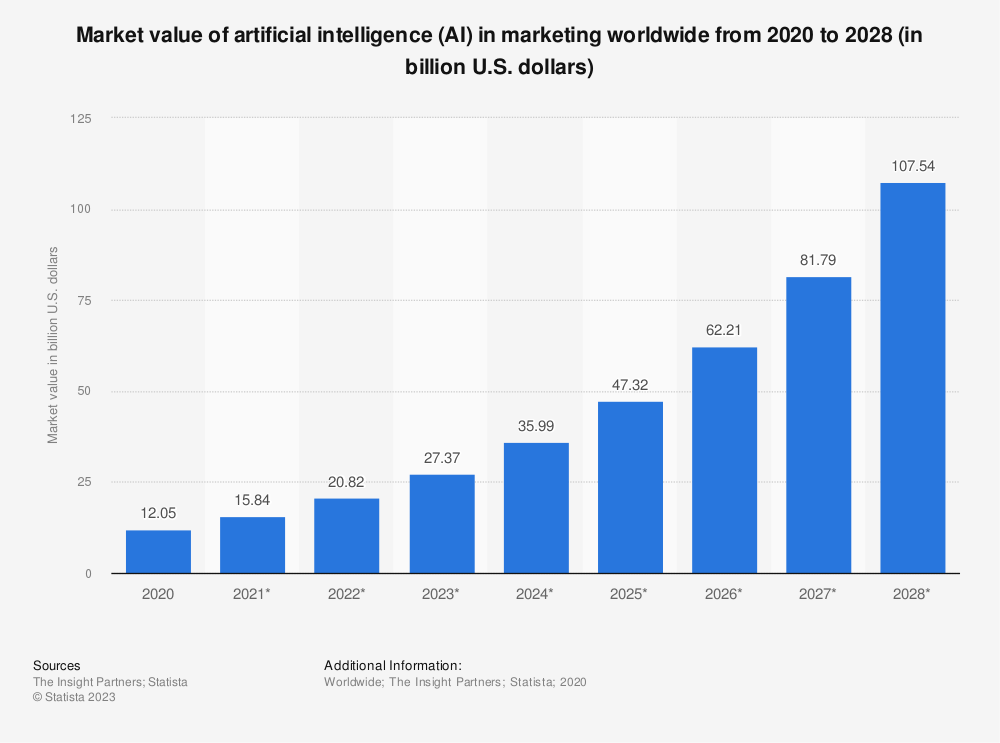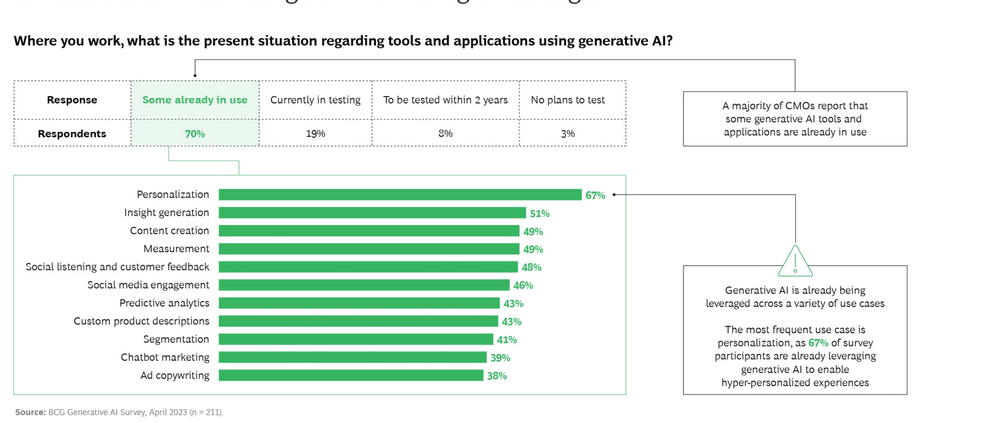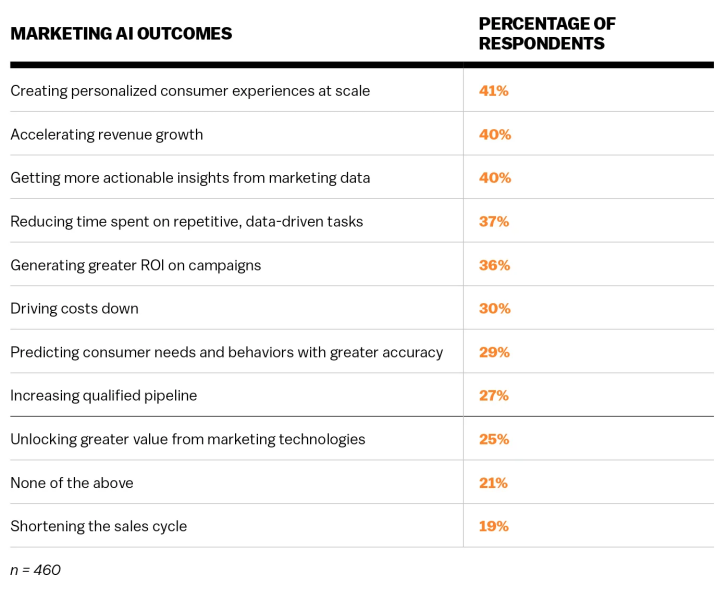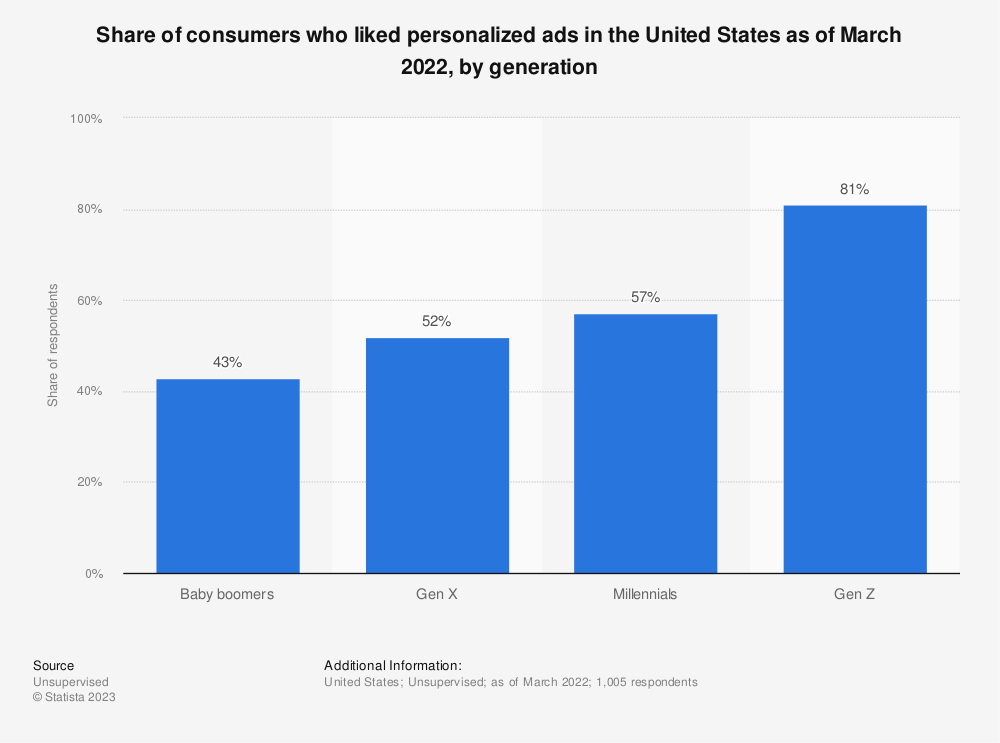Artificial intelligence (AI) is permeating into all manners of different business functions and the use of AI in marketing is already changing the industry. While companies have always been using AI to enhance productivity the technology is at a pivotal moment with an increasing number of companies adopting AI.
AI can be of immense help in marketing as the technology can enhance and complement the existing strategy. Several AI technologies – including generative AI can be used in marketing.
Among others, AI can be used in marketing functions like data analytics, content generation and personalization, automated marketing campaigns, and chatbots, as well as help in buying the most appropriate media platforms for ad campaigns.
What Kinds of AI Technology Are Used in Marketing?
According to McKinsey “Artificial intelligence is a machine’s ability to perform the cognitive functions we usually associate with human minds.”
Sam Altman, who is the CEO of ChatGPT’s parent company OpenAI believes that the company would eventually reach “artificial general intelligence” – which means an AI model intellectually better than humans and with ability to improve itself.”
As the AI models continue to improve, their utility in marketing would also continue to rise. Various AI technologies including generative AI, semantic search, machine learning (ML), and natural language processing (NLP) can be used in marketing.

According to Statista, the total market for AI in marketing was $15.84 billion in 2021 which is expected to rise to $107.5 billion by 2028.
Natural Language Processing
NLPs help companies track real-time data which helps them respond to customer feedback and requirements quickly.
It goes without saying that this would help improve the overall customer experience and eventually lead to better customer retention.
NLP is used in several other marketing functions, and when used with AI it can help write better product descriptions as well as blog posts.
It can also be used for personalized content. For instance, companies can use mobile voice analytics to identify the user’s tone and them with the information.
For example, if it identifies that the user is looking for some urgent information, it can provide short content, conversely, a user who is supposedly looking for detailed information can be provided longer and more comprehensive content.
Semantic Search
Semantic search helps apply the semantics (meaning) of words and find the right content. Unlike the usual keyword matching it helps find what the searcher really wants or in other words, identify the intent without depending on the keyword.
According to Sprout Social, “This eliminates chances of duplicates in text mining, especially where sentiment analysis is concerned, for an accurate measure of customer experience or brand performance.”
Semantic search algorithms are crucial for NLP as they help identify the user’s intent and contextual meaning behind a query – which eventually leads to more relevant results.
Artificial intelligence (#AI) and machine learning (ML) continue to push the boundaries of what is possible in marketing and sales.
Now, generative AI promises to disrupt the way B2B and B2C players think about customer experience, and growth. Learn more: https://t.co/ERpxOoAwm4 pic.twitter.com/UQf9WE5geu
— McKinsey & Company (@McKinsey) August 4, 2023
Machine Learning
ML is another tool through which AI is helping the marketing function. ML is used to analyze and predict consumer behavior and the data can then be applied to personalize the advertising campaign.
It can also be used to improve pricing strategies and make informed decisions based on data. Using ML in marketing can help reduce costs through automation. This is another benefit of using AI in marketing, as it allows marketing professionals to save time that can be focused on value-adding projects.
ML can also help in customer segmentation which can help in devising personalized marketing campaigns.
Generative AI
Generative AI is already being used in marketing, and its usage is likely to grow in the next few years. When used properly, it has shown to make marketers significantly more efficient while maintaining similar quality levels. An April 2023 survey by the Boston Consulting Group (BCG), which surveyed over 200 chief marketing officers (CMOs) across various sectors in eight countries in North America, Europe, and Asia, found that 70% of companies are currently using generative AI, while 19% are in the testing phase.

Three main areas where CMOs are using generative AI are:
- Personalization: 67% of the respondents said that they use generative AI for personalization. The BCG said, “The goals and benefits of these efforts range from better engagement to improved conversion rates to increased customer loyalty.”
- Content creation: 49% of respondents said that they use generative AI for content creation.
- Market segmentation: The BCG survey showed that 41% of respondents use generative AI for market segmentation. The report added, using generative AI in marketing “can also enhance consumer and product strategy by changing how—and how fast—companies can conduct reliable market and consumer research and then use the resulting insights to improve their products and services.”
How Is AI Used in Marketing?
According to a Harward Business Review report, “Of all a company’s functions, marketing has perhaps the most to gain from artificial intelligence. Marketing’s core activities are understanding customer needs, matching them to products and services, and persuading people to buy—capabilities that AI can dramatically enhance.”

According to Drift’s 2022 State of Marketing and Sales AI report, 51% of the respondents said that AI is either critically important or very important for the success of their marketing over the next 12 months. Another 33% said that it is somewhat important while only 6% said that it’s not important at all.
AI is being used in multiple marketing functions which include content creation, market segmentation, personalized ads, product pricing, as well as creating chatbots.
To be sure, AI has always been deployed by many marketers for content creation and its use is only increasing with the growing adoption of generative AI. Similarly, companies are using AI to better understand customer needs and then come up with better products and services.
Creating personalized content
AI helps marketers in creating personalized content which is proven to be more effective than generic ads. AI can help understand the customer better and companies can then segment them to come up with better customized content. Another offshoot of this is personalized ad campaigns through the use of AI.
AI can also help identify keywords that would enable businesses to write persuasive content. It would also help to better respond to customer comments and feedback.

Many users in the US like personalized ads and a 2022 survey showed that 81% of Gen Z users like personalized ads. The percentage decreased with age though – but still 57% of millennials like personalized ads.
Data Analytics
Data analytics is another key use of AI in marketing. Using AI-powered data analytics would also help in taking better strategic marketing decisions including allocating marketing dollars and choosing the correct media for advertisement.
AI would also help marketers to respond swiftly to changing market trends and tweak their strategy to respond to any changes in the marketplace. Companies can also use data analytics to arrive at a pricing strategy.
Automation
AI can help automate several marketing functions. Automated marketing campaigns including email campaigns are another way through which companies can use AI in marketing. It’s a cost-efficient way and when used along with AI it can create better results with a targeted approach.
Chatbots are another way through which AI helps in marketing. While chatbots have been around for a long, they would get better with generative AI.
What Impact Is AI Having in Marketing?
AI is already having an impact on marketing. Companies are using it to understand the consumer better and using it to not only enhance their existing proposition – but also come up with new products and services.
Companies are also using AI to understand their customers better. This helps in increasing customer loyalty towards the brand and increasing customer retention.
AI is helping companies lower costs across the board and while most companies are using AI to optimize their logistics and supply chain costs – using AI in marketing is also helping lower costs.
Notably, a CNBC/ SurveyMonkey Workforce Survey showed that 46% of employees in marketing and advertising verticals fear that AI would make their jobs obsolete – which is twice the overall average.
How Can AI Be Used in Marketing in the Future?
Meanwhile, AI is yet to make major inroads into marketing but a 2017 analysis by McKinsey showed that marketing is one business function where AI would add the most value.
One of the reasons some companies have been hesitant to use AI in marketing is because it’s seen as a function where a high degree of emotions and by its extension human involvement are required. Also, some companies fear that AI might generate offensive or inappropriate content which would harm the brand.
Meanwhile, the use of AI in marketing looks set to increase in the future. These include:
Generative AI in Marketing
Since generative AI is still in its early stage, a lot of companies might test the waters before pivoting to the technology. With the current state of even the best generative AI systems, they still need to be fact-checked and watched over by a person to make sure they don’t make glaring errors. As generative AI gets better, the need for a human bottleneck will likely evaporate and efficiency will skyrocket. Companies like Amazon AWS offer tools that can help companies further integrate generative AI into their marketing to make the process as efficient as possible. Amazon incidentally sees a big opportunity in AI and is integrating it across different business functions.
Combining AI with AR
Earlier this year, Snap launched its new service around augmented reality (AR) which lets users try apparel and wearables from the comfort of their homes. AI is already being used in AR technology in solutions like complex resolution up-scaling. Combining AI with AR could power a whole host of useful features for marketers.
For instance, as more companies integrate AI chatbots into their ecommerce platforms to help buyers select the right product and service, they might also consider combining it with AR to make the proposition even better.
Making Real-Time Decisions Based on AI
While AI is being used to make decisions including in marketing, generative AI would help companies take decisions in real time. This could entail changing the product pricing based on the market as well as gauging the demand and supply in real-time.
How to Start Using AI In Your Marketing Strategies Right Now
There are several ways to use AI in marketing strategies right away. Amazon AWS for instance offers multiple tools to integrate generative AI into the marketing function.
Companies like Affectiva help build ML models to understand human emotions. Over a quarter of Fortune 500 companies use its media analytics solution.
Conversational AI platforms like Ada can also help the business in handling customer queries and leading companies like Zoom already use the solutions.
ChatGPT is already an incredible tool for whipping up decent copy and Jasper is another cheap AI marketing tool and helps write good copy fast. Tools like Verloop can help you easily add chatbots to your website, app, or WhatsApp.
Overall, with the use of AI in marketing increasing by the day, businesses not using AI might lag behind the race as their competitors pivot to AI.